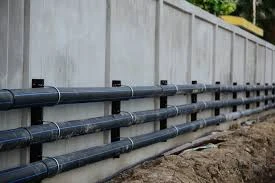Dec . 10, 2024 16:34 Back to list
pvc electrical pipe
Exploring PVC Electrical Pipes A Comprehensive Guide
In the realm of electrical installations, the choice of materials is pivotal to ensuring safety, efficiency, and durability. Among various options available, PVC (Polyvinyl Chloride) electrical pipes have gained immense popularity for their versatility, affordability, and robustness. This article delves into the features, benefits, installation procedures, and applications of PVC electrical pipes, providing valuable insights for electricians, engineers, and DIY enthusiasts alike.
Understanding PVC Electrical Pipes
PVC electrical pipes are designed specifically for the protection and routing of electrical wires and cables. Made from polyvinyl chloride, these pipes are lightweight, resistant to corrosion, and boast excellent electrical insulation properties. PVC pipes come in various sizes and thicknesses, allowing for tailored solutions based on specific installation needs.
Key Benefits of PVC Electrical Pipes
1. Durability and Longevity One of the significant advantages of PVC electrical pipes is their durability. They are resistant to environmental factors such as moisture, UV rays, and chemicals, which makes them suitable for both indoor and outdoor applications. Their longevity reduces the need for frequent replacements, making them a cost-effective choice in the long run.
2. Lightweight and Easy to Handle Unlike metal conduits that can be heavy and cumbersome, PVC pipes are remarkably lightweight. This feature simplifies the handling and transportation of materials, thereby speeding up the installation process and reducing labor costs.
3. Cost-Effective PVC electrical pipes are generally less expensive than their metal counterparts. Their affordability does not compromise quality; in fact, they offer significant savings in both material and installation costs.
4. Chemical Resistance PVC's excellent resistance to a wide array of chemicals makes it ideal for various environments, including industrial and commercial settings where exposure to hazardous substances is likely.
5. Design Flexibility PVC pipes can be easily cut, shaped, and joined together using various fittings and adhesives, allowing for versatile designs that meet diverse electrical installation requirements. This flexibility aids in navigating complex building layouts.
6. Fire Resistance While PVC itself is not inherently fireproof, it has been engineered to resist ignition and self-extinguish when removed from a flame source. This quality can enhance the overall fire safety of electrical installations.
Installation of PVC Electrical Pipes
pvc electrical pipe

Installing PVC electrical pipes involves several key steps
1. Planning and Design Before installation, careful planning is essential. The layout should include consideration of the size of the pipes required, the distances between junction boxes, and any necessary bends or turns.
2. Cutting the Pipes PVC pipes can be cut to desired lengths using a hacksaw or specialized PVC cutters. It is crucial to ensure clean cuts to avoid jagged edges, which could hinder the joining process.
3. Joining and Sealing Pipes and fittings can be joined using PVC cement or solvent for a watertight seal. It’s important to follow the manufacturer's instructions for the best results.
4. Securing the Installation Once in place, the PVC pipe should be secured using straps or brackets to prevent movement and ensure stability. Proper support prevents sagging and potential damage over time.
5. Wiring After the piping is secured and in place, electrical wiring can be pulled through the conduits. Ensure that the types and gauges of wires used are compatible with the PVC piping system.
Applications of PVC Electrical Pipes
PVC electrical pipes are used in a myriad of applications, including
- Residential Wiring For routing electrical wires in homes, both within walls and in exposed areas. - Commercial Installations Suitable for office buildings, shopping malls, and industrial premises where a robust electrical infrastructure is required. - Outdoor Applications Ideal for outdoor lighting and electrical setups due to their resistance to weather conditions. - Underground Wiring PVC pipes are often buried underground to protect electrical lines from damage.
Conclusion
In summary, PVC electrical pipes provide an efficient, cost-effective, and durable solution for electrical installations across various settings. Their numerous benefits, from chemical resistance to easy handling, make them an excellent choice for both professional electricians and DIY enthusiasts. Understanding their features and correct installation practices can significantly enhance the safety and longevity of electrical systems. With ongoing innovations in material science, the future of PVC electrical pipes looks promising, ensuring they remain a staple in electrical wiring applications for years to come.
-
Durable PP Rigid Sheet: Lightweight, Chemical Resistant Solutions
NewsAug.21,2025
-
PVC Grey Sheet for Extraction: Chemical Resistant & Durable
NewsAug.19,2025
-
Durable PVC Pipe Fittings for Plumbing & Irrigation Needs
NewsAug.18,2025
-
HDPE Steel Belt Reinforced Spiral Corrugated Pipe | High Strength
NewsAug.17,2025
-
HDPE Pipe Fittings: Durable, Leak-Proof Solutions
NewsAug.16,2025
-
Premium CPVC Sheet: High-Temp & Chemical Resistant Solutions
NewsAug.15,2025

